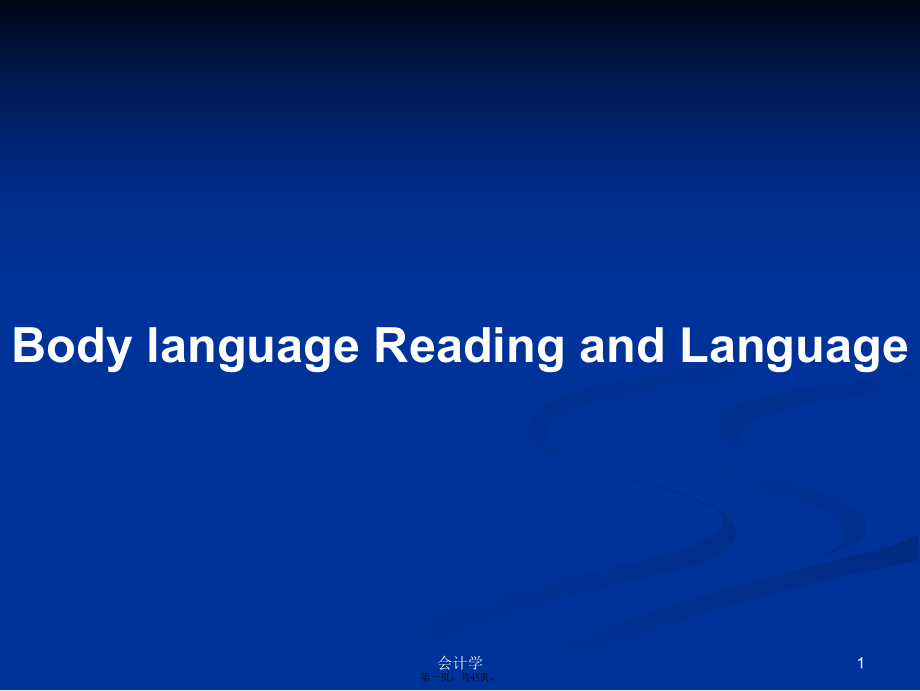《Body language Reading and Language學(xué)習(xí)教案》由會(huì)員分享�,可在線閱讀,更多相關(guān)《Body language Reading and Language學(xué)習(xí)教案(45頁珍藏版)》請(qǐng)?jiān)谘b配圖網(wǎng)上搜索�。
1�����、會(huì)計(jì)學(xué)1Body language Reading and Language第一頁����,共45頁。 第1頁/共45頁第二頁�����,共45頁�。speakingringingwritingtypingSpoken languageWritten languageBody languageWays of communicating gesturing第2頁/共45頁第三頁,共45頁��。第3頁/共45頁第四頁�,共45頁。 thumbs upgood job / the number one第4頁/共45頁第五頁,共45頁��。OKbad第5頁/共45頁第六頁����,共45頁。Come here.Be quiet!第6頁/共
2����、45頁第七頁,共45頁����。thoughtful第7頁/共45頁第八頁,共45頁���。 excited tired第8頁/共45頁第九頁��,共45頁�����。surprised angry sadIts unfair!Wheres myMum?I won a tour around world?第9頁/共45頁第十頁���,共45頁����。disappointedWhy cant I find a good job?第10頁/共45頁第十一頁�����,共45頁����。Look at the photo and skim the story to find out: 1. What is the main topic of the sto
3、ry? 2. Where are Debbie and Simon? Body language.They are at work, in the office of a travel agency.第11頁/共45頁第十二頁�����,共45頁���。3. Who gives Simon advice? 4. In the photo, which person looks more friendly, the boy or the girl?A senior employee, Mr Young.The girl (Debbie).第12頁/共45頁第十三頁,共45頁��。 Read the story an
4�����、d complete the chart:nameBody language outcomeDebbieSimonsit up and hold head up, make eye contact with the customers, always smile, greet cheerfully look friendly, make others feel welcome rest head on hand, look downwards, never smile, look unfriendly, make others go away 第13頁/共45頁第十四頁����,共45頁�。第14頁/共
5�����、45頁第十五頁����,共45頁。exit 退出,退場(chǎng)(tu chn) v.出口 n. entrance 入口(r ku) n. exit visa出境簽證 fire exit安全出口第15頁/共45頁第十六頁�����,共45頁����。 greet 和某人打招呼,迎接(yngji)v. greeting 問候�,歡迎n. People in France greet friends with kissing instead of shaking hands.第16頁/共45頁第十七頁,共45頁�。Miss Cat left with a sigh.Poor guy! 第17頁/共45頁第十八頁,共45頁����。 a seni
6��、or employee一位級(jí)別(jbi)較高的職員 senior: holding a higher position employee: a person who is paid to work for other people第18頁/共45頁第十九頁���,共45頁。第19頁/共45頁第二十頁���,共45頁���。第20頁/共45頁第二十一頁,共45頁�。第21頁/共45頁第二十二頁,共45頁��。 語言語言(yyn)并不是我們唯一的溝通并不是我們唯一的溝通方式方式.Its the way you stand and sit.定語定語(dngy)從句從句它是你站立它是你站立(zhn l)和坐姿的方式���。和坐姿的
7、方式���。第22頁/共45頁第二十三頁��,共45頁��。 那是一種(y zhn)怎樣的語言? What kind/sort of?什么類型��? What kind/sort of shoes would you like?What kind of language is that?第23頁/共45頁第二十四頁��,共45頁�����。第24頁/共45頁第二十五頁���,共45頁���。Simon make a good imopression on sb. 給某人留下給某人留下(li xi)好印象好印象第25頁/共45頁第二十六頁,共45頁�����。Debbie 第26頁/共45頁第二十七頁�,共45頁。第27頁/共45頁第二十八頁�����,共45
8����、頁�����。第28頁/共45頁第二十九頁��,共45頁���。第29頁/共45頁第三十頁,共45頁����。C Find the meaning1. d2. f3. a4. c5. e6. bC1C21. sighed2. appearance3. without hesitation4. part-time5. gestures6. speech第30頁/共45頁第三十一頁,共45頁�����。D Read and think4261735第31頁/共45頁第三十二頁�,共45頁。D2 Read the story again and answer the following questions.1 Why was Simon
9�、unhappy?2 What are the two ways of communication inthe story?The customers always prefer Debbie to him.Speech and body language.第32頁/共45頁第三十三頁�,共45頁。3 What is body language, according to Mr Young?4 Why did the customers not go to Simon? Its the way someone stands and sits. Its gestures and the expres
10��、sion on someonesface and in his or her eyes.He didnt make a good impression on the customers.第33頁/共45頁第三十四頁�����,共45頁。5. Did Mr Young think Debbie had good bodylanguage? Why?6. Did Simon take Mr Youngs advice? What did he decide to do?No. Because he often rest his head on hishand. He doesnt look up. He n
11��、ever smiles. Yes, he did. He decided to improve his body language.第34頁/共45頁第三十五頁�,共45頁。1. Sarah glanced at the news and said nothing.Sarah quickly read the news and said nothing.2. The picture reminded me of my childhood.The picture helped me remember my childhood.第35頁/共45頁第三十六頁���,共45頁���。3. She agreed to
12、 go with us without hesitation.She agreed to go with us at once.4. An air-hostess should make eye contact with passengers when they ask for help.An air-hostess should look directly at passengers when they ask for help.第36頁/共45頁第三十七頁��,共45頁�。5. He prefers math to English.He likes math better than Englis
13、h.6. We have made up our minds to improve our English. We have decided to make our English better.第37頁/共45頁第三十八頁��,共45頁���。7. Please give my regards to your parents. Please remember me to your parents.8. Whats up, Simon?Whats the matter, Simon?Whats happening, Simon?第38頁/共45頁第三十九頁���,共45頁。exit 退出,退場(chǎng)(tu chn)
14、 v.出口 n. entrance 入口(r ku) n. exit visa出境簽證 fire exit安全出口第39頁/共45頁第四十頁����,共45頁。 那是一種(y zhn)怎樣的語言? What kind/sort of?什么類型��? What kind/sort of shoes would you like?What kind of language is that?第40頁/共45頁第四十一頁���,共45頁����。Debbie 第41頁/共45頁第四十二頁�,共45頁。第42頁/共45頁第四十三頁����,共45頁。5. Did Mr Young think Debbie had good bodylan
15����、guage? Why?6. Did Simon take Mr Youngs advice? What did he decide to do?No. Because he often rest his head on hishand. He doesnt look up. He never smiles. Yes, he did. He decided to improve his body language.第43頁/共45頁第四十四頁,共45頁��。3. She agreed to go with us without hesitation.She agreed to go with us at once.4. An air-hostess should make eye contact with passengers when they ask for help.An air-hostess should look directly at passengers when they ask for help.第44頁/共45頁第四十五頁��,共45頁���。
 Body language Reading and Language學(xué)習(xí)教案
Body language Reading and Language學(xué)習(xí)教案

